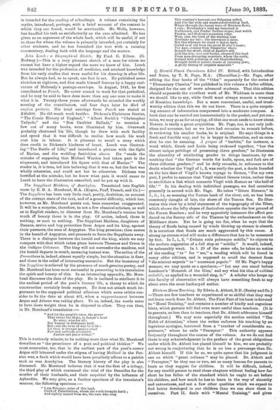The Suppliant Maidens, of Aeschylus. Translated into English verse by
E. D. A. Morehead, M.A. (Kegan, Pant Trench, and Co.)-.-- The Supplices has been very little read, partly, doubtless, on account of the corrupt state of the text, and of a general difficulty, which has, however, as Mr. Morehead points out, been somewhat exaggerated. It will be a surprise, therefore, to not a few classical scholars, as well as to English readers, to discover from Mr. Morshead's version how much ol beauty there is in the play. Of action, indeed, there is nothing, or next to nothing. The Suppliant Maidens, daughters. of Renew*, arrive and beg protection from Argos and its king, against their pursuers, the sons of Aegyptns. The king promises; then comes in the herald of Aegyptas, and proceeds to force the Suppliants away. There is a dialogue between the herald and the king, which we may -compare with that which takes place between Thesseus and Creon in the Oedipus Coloneus. The king will not surrender the maidens, and the herald departs in wrath, menacing instant war. The action of the Prometheus is, indeed, almost equally simple, but the situation is finer, and there is the relief of interesting narrative. But the Monotony of the Supplices is relieved by the presence of much genuine poetry, and Mr. Morehead has been most successful in preserving in his translation the spirit and beauty of this. In an interesting appendix, Mr. More- head discusses the date of the play. He is inclined to attribute it to the earliest period of the poet's literary life, a theory to which its construction certainly lends support. He does not attach much im- portance to the supposed political allusions which some critics con- sider to fix the date at about 461, when a rapprochement between Argos and Athens was taking place. To us, indeed, the words seem to have More weight than he is disposed to allow. They run thus, in Mr. Morshead's translation :— "And let the peop'e's voice, the power That sways the State, in danger's hour Be wary, wise for all; Nor honour in dishonour hold, But—ere the vo'cle of war be bald— Let them to stronger peoples grant Pair and unbloody covenant—
Justice and peace withal?'
This is curiously minute, to be nothing more than what Mr. Morehead describes as "the prescience of a poet and political thinker." We must-remember, too, that in the earliest part of the poet's career Argos still laboured under the stigma of having Medized in the Per- • sian war, a fault which would have been peculiarly odious to a patriot such as was Aeschylus. The literary history of the play is also discussed. Mr. Morehead believes that it was the first of a trilogy, the third play of which contained the trial of the Danaides for the murder of their husbands, and their acquittal by the influence of Aphrodite. We may give, as a further specimen of the translator's manner, the following specimen :— "I am Pelssgae, ruler of this land, "
Child of Palaicththon, whom the earth brought forth ; And rightly named from me, the race who reap This country's harvests are Pelasgian called, And o'er the wide and westward-stretching land, Where through the lucent wave of Strymon flows, I rule ; Perrhaebie.'s land my boundary is Northward, and Pindus' further slopm, that watch Paionia, and Dodona's mountain ridge. West, east, the limit of the washing seas Restrains my rule; the interspace is mine. But this whereon we stand ii Anian land, Styled co of old from the great R,ialer's name; For Apis, coming from Nanpactus' shore Beyond the strait, child of Apollo's self, And like him, seer and healer, cleansed this land From man-devouring monsters, whom the earth, Stained with pollution of old blood-shedding, Brought forth in malice, beasts of ravening jaws, A grisly throng of serpents manifold."


































 Previous page
Previous page